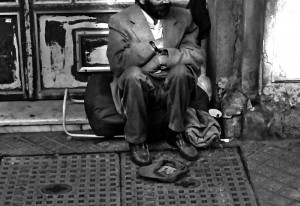Premise
Seeking revival is seeking God, who sought us in Jesus Christ. Seeking God includes seeking the welfare of the poor. Disregard for the poor indicates a heart dead to God.
We’ll examine this with the same template we’ve been studying for weeks: humility, prayer, and repentance/seeking God (drawn from 2 Chronicles 7:14).
Humility and the Poor
In Isaiah 58, God explains to his people why their humble fasting hasn’t “worked”. It hasn’t worked because they’ve substituted a religious form of fasting for the form of fasting God chooses.
In Isaiah 58, God explains to his people why their humble fasting hasn’t “worked”. It hasn’t worked because they’ve substituted a religious form of fasting for the form of fasting God chooses.
Is this not the fast that I choose:
to loose the bonds of wickedness,
to undo the straps of the yoke,
to let the oppressed go free,
and to break every yoke?
Is it not to share your bread with the hungry
and bring the homeless poor in to your house…
Isaiah 58:6-7
Humility is escaping self to worship and trust God and serve other people, especially the poor.
Prayer and the Poor
God goes on to say that once his people take on the lifestyle of freeing the oppressed, feeding the hungry, and housing the poor, then they can expect answers to their prayers.
God goes on to say that once his people take on the lifestyle of freeing the oppressed, feeding the hungry, and housing the poor, then they can expect answers to their prayers.
Then shall you call, and the LORD will answer:
you shall cry, and he will say, ‘Here I am.’
Isaiah 58:9
Have you ever noticed Jesus’ train of thought in Matthew 6, where he lays out the famous “Lord’s Prayer”? His line of thinking moves from giving to the needy (v.1-4) to praying (v.5-15) to fasting (v.16-18) to laying up treasure in heaven rather than hording earthly treasures (v.19-24) to trusting God for your own provision (v.25-34). Generosity to the poor, praying, fasting, and trusting God are all connected in the mind of Jesus. And so they should be in the lives of his followers.
Repentance and the Poor
In Isaiah 1, God expresses his displeasure with his people who had become ingrown religious hypocrites and needed to repent. But he doesn’t demand that they do so via different or purer religious acts, but through valiantly fighting for vulnerable people. He instructs them to:
…learn to do good;
seek justice,
correct oppression;
bring justice to the fatherless,
plead the widow’s cause.
Isaiah 1:17
The startling fact is this: concern for those in need identifies us as Christians. Lack of concern for those in need identifies us as non-Christians.
Read Matthew 25:31-46. In the end, Jesus will return and all the nations will stand before his judgment when he will separate the sheep and the goats. The sheep get to enter the kingdom of God. The goats get damnation. Which are you? How can you tell? How does Jesus distinguish the two? Just as sheep look different from goats, so do the saved from the unsaved.
The blessed ones are those who feed the hungry, water the thirsty, welcome strangers (vulnerable foreigners, like immigrants), clothe the naked, and visit the sick and imprisoned. The cursed ones do not. That’s how Jesus identifies the sheep and the goats.
The Aroma, Not the Recipe
Does this mean that we are saved by our good works toward the poor? No. Care for the vulnerable is not the recipe for Christianity, it’s the aroma of Christianity. Hearts transformed by the grace of Jesus Christ carry his concern for the poor.
So use this to examine yourself, not to save yourself. If you’ve read all this and remained unmoved toward the poor, you need to consider Jesus carefully.
He claimed to be God’s son, sent to atone for our sins and establish the kingdom of God under his rule. Christians believe he is who he claimed to be and follow his rule and in return receive new hearts and new lives (2 Corinthians 5;17). The first question to ask is this: Am I a Christian? And if you’re not sure or the answer is no, I urge you to trust and follow Jesus Christ. If you have questions that stand between you and this decision, please contact me (matthewbroadway@gmail.com or 704.545.5893).
If you are a believer and follower of Jesus and a deep desire to serve the needy is awakening in your heart for the first time, you just need to know where to begin. This post isn’t the place to dive into it, but here are a few pointers: Start close to you. Is there a vulnerable person in your family that needs care? A single mom? An elderly person? A household with both parents out of work? Can you reorganize your budget to give more to your church or organizations like Crisis Assistance Ministry? Can you buy extra groceries to donate to food pantries like Loaves and Fishes? Are you a business owner who needs to rethink how you do business to better fight for the rights of the poor? Does your line of work directly oppress anyone – and you know you need to make a change?
Also, educate yourself on the incredibly complex issues associated with poverty. Two books I recommend: Generous Justice by Tim Keller and When Helping Hurts by Korbett and Fikkert.
But whatever you do, do not spray some donations or volunteerism over your life like Febreze. Go to Jesus and be transformed into an advocate for the vulnerable.
Discussion Starters
1. Do you agree that ministry to the poor is an inextricable part of seeking God? Why or why not?
2. What aspects of ministry to the poor make you uncomfortable?
3. Read Matthew 25:31-46. Why does this particular list so identify sheep? Why not other things, like reading the Bible a lot or praying a lot? (See James 2:14-26 for help)
a. Work together to list the identifying marks of sheep.
b. What would this look like for you as an individual? What’s your next step toward seeking the welfare of those in need?
c. What would this look like for your family?
d. What would this look like for our church? Your H2H group?
4. What do you think is the church’s role in serving the poor (think programs and organized activities)? What is the role of individual Christians operating as the scattered church?
5. How can you best serve each other in light of these passages?
6. How can your group pray for you this week?
Note
Keep an eye on the website for a new page coming soon. It will be devoted to opportunities to serve those in need through organizations outside the church. This will be a great resource for you, your family, and your small group.






